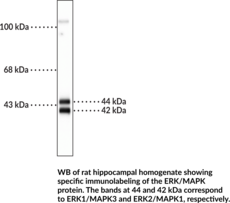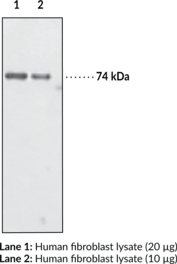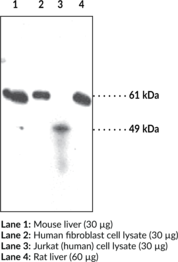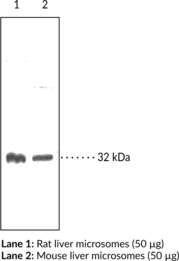Description
Extracellular-signal-regulated kinase/mitogen-activated protein kinases (ERK/MAPKs) are a widely conserved family of serine/threonine protein kinases and essential components of the MAP kinase signaling cascade.{53684,53685} Upon extracellular stimulation with mitogens, growth factors, or cytokines, a sequential three-part signaling cascade is initiated that terminates with phosphorylation of ERK/MAPK by MEK1 or MEK2. Activated ERK/MAPK is translocated to the nucleus where it regulates transcription factor activity and gene transcription for a variety of cellular processes including cell proliferation, differentiation, and stress response. Misregulation of the MAP kinase cascade drives development of various cancers. ERK1/MAPK3 and ERK2/MAPK1 are two key members of the ERK/MAPK family encoded by MAPK3 and MAPK1, respectively, in humans and are expressed in all tissues. Cayman’s ERK/MAPK Polyclonal Antibody can be used for immunocytochemistry (ICC) and Western blot (WB) applications. The antibody recognizes ERK1/MAPK3 and ERK2/MAPK1 at approximately 44 and 42 kDa, respectively from human, mouse, and rat samples.
Synonyms: MAP Kinase|Mitogen-activated Protein Kinase
Immunogen: Peptide corresponding to amino acid residues from the C-terminus of rat ERK/MAPK
Formulation: 100 µl of Affinity-purified rabbit polyclonal antibody
Isotype:
Applications: ICC and WB
Origin:
Stability: 365 days
Application|Immunocytochemistry||Application|Western Blot||Product Type|Antibodies|Polyclonal Antibodies||Research Area|Cancer|Cell Signaling|ERK/MAPK Signaling||Research Area|Cell Biology|Cell Signaling|ERK/MAPK Signaling




